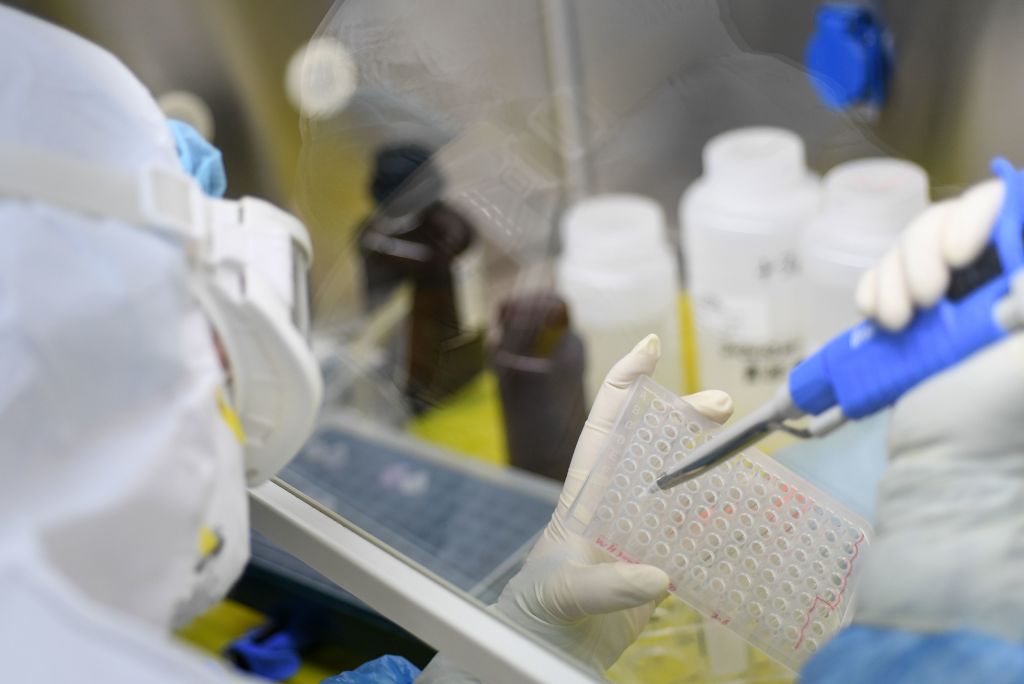Coronavirus genomes show New York's COVID-19 outbreak came from Europe months ago


A free daily email with the biggest news stories of the day – and the best features from TheWeek.com
You are now subscribed
Your newsletter sign-up was successful
The U.S. has nearly a third of the world's 1.5 million official COVID-19 cases, and New York, by itself, has more coronavirus cases than any single foreign country. But while the coronavirus outbreak started in Wuhan, China, in late 2019, most of the New York cases came from Europe, and the European mutation was spreading silently around the New York City area by mid-February, two separate groups of viral historians have determined, The New York Times reported late Wednesday.
Teams of geneticists at Icahn School of Medicine at Mount Sinai and the NYU Grossman School of Medicine separately studied the genomes of coronavirus samples from different groups of COVID-19 cases in New York. "The research revealed a previously hidden spread of the virus that might have been detected if aggressive testing programs had been put in place," the Times notes. As it was, New York got its first positive COVID-19 test on March 1, followed a couple of weeks later by a surge of cases.
The silent spread of the coronavirus proved devastating. It became clear the coronavirus had been circulating locally in the Seattle area when a team at the Fred Hutchinson Cancer Research Center and the University of Washington sequenced the genome of a new COVID-19 patient in late February and found it shared genetic mutation from a case detected Jan. 20, likely from Wuhan. The New York researchers started sequencing samples soon after. President Trump closed off most travel from China on Jan. 31 but did not restrict foreigners coming from Europe until March 11.
The Week
Escape your echo chamber. Get the facts behind the news, plus analysis from multiple perspectives.

Sign up for The Week's Free Newsletters
From our morning news briefing to a weekly Good News Newsletter, get the best of The Week delivered directly to your inbox.
From our morning news briefing to a weekly Good News Newsletter, get the best of The Week delivered directly to your inbox.
Geneticists can trace the path a virus took by studying small mutations in its genome. The variations in this new coronavirus map the history of the virus but the mutations don't seem to affect how the virus works, which is welcome news in the hunt for a vaccine. Read more about the science and the genetic history of COVID-19 at The New York Times.
A free daily email with the biggest news stories of the day – and the best features from TheWeek.com
Peter has worked as a news and culture writer and editor at The Week since the site's launch in 2008. He covers politics, world affairs, religion and cultural currents. His journalism career began as a copy editor at a financial newswire and has included editorial positions at The New York Times Magazine, Facts on File, and Oregon State University.
-
 5 cinematic cartoons about Bezos betting big on 'Melania'
5 cinematic cartoons about Bezos betting big on 'Melania'Cartoons Artists take on a girlboss, a fetching newspaper, and more
-
 The fall of the generals: China’s military purge
The fall of the generals: China’s military purgeIn the Spotlight Xi Jinping’s extraordinary removal of senior general proves that no-one is safe from anti-corruption drive that has investigated millions
-
 Why the Gorton and Denton by-election is a ‘Frankenstein’s monster’
Why the Gorton and Denton by-election is a ‘Frankenstein’s monster’Talking Point Reform and the Greens have the Labour seat in their sights, but the constituency’s complex demographics make messaging tricky
-
 A Nipah virus outbreak in India has brought back Covid-era surveillance
A Nipah virus outbreak in India has brought back Covid-era surveillanceUnder the radar The disease can spread through animals and humans
-
 Trump HHS slashes advised child vaccinations
Trump HHS slashes advised child vaccinationsSpeed Read In a widely condemned move, the CDC will now recommend that children get vaccinated against 11 communicable diseases, not 17
-
 Covid-19 mRNA vaccines could help fight cancer
Covid-19 mRNA vaccines could help fight cancerUnder the radar They boost the immune system
-
 FDA OKs generic abortion pill, riling the right
FDA OKs generic abortion pill, riling the rightSpeed Read The drug in question is a generic version of mifepristone, used to carry out two-thirds of US abortions
-
 The new Stratus Covid strain – and why it’s on the rise
The new Stratus Covid strain – and why it’s on the riseThe Explainer ‘No evidence’ new variant is more dangerous or that vaccines won’t work against it, say UK health experts
-
 RFK Jr. vaccine panel advises restricting MMRV shot
RFK Jr. vaccine panel advises restricting MMRV shotSpeed Read The committee voted to restrict access to a childhood vaccine against chickenpox
-
 Texas declares end to measles outbreak
Texas declares end to measles outbreakSpeed Read The vaccine-preventable disease is still spreading in neighboring states, Mexico and Canada
-
 RFK Jr. shuts down mRNA vaccine funding at agency
RFK Jr. shuts down mRNA vaccine funding at agencySpeed Read The decision canceled or modified 22 projects, primarily for work on vaccines and therapeutics for respiratory viruses
